
21 minute read
Around Town
from Our Town: May 2020
AroundTown
Mississippi Valley Regional Blood Center (MVRBC) will collect plasma donations from patients who have recovered from a COVID-19 infection to help newly diagnosed patients fight the disease.
The treatment, known as convalescent plasma therapy, requires plasma provided by donors who have recently recovered from a COVID-19 infection. These donors will have antibodies to help fight COVID-19. The treatment has been used in recent years to treat victims of Ebola, SARS, and H1N1 influenza.
“Our teams have moved quickly to develop processes and protocol to provide convalescent plasma for the hospitals we serve,” said Mike Parejko, Chief Executive Officer. “While this treatment is not a cure, it might help alleviate the symptoms patients experience with COVID-19. If we can help take a patient off a ventilator or get them out of the hospital, it will help patients return to good health and free up precious resources when they are needed most.”
To provide convalescent plasma, donors must be fully recovered from their COVID-19 infection and must meet all standard eligibility criteria for blood donation. Plasma will only be collected from donors with laboratory-confirmed tests showing they had a COVID-19 infection and must be at least 28 days from the last date they experienced symptoms.
Each donor must be referred to the blood center by their physician or care provider, who must provide certain information to qualify the donor. A donor must meet standard criteria for donor eligibility. Donors will be scheduled for a plasma donation at an MVRBC Donor Center. Potential donors are asked to contact their physician to make a referral as a COVID-19 convalescent plasma donor. Physicians wishing to refer patients for donation should use the referral form available at www.bloodcenter. org. For additional information, potential donors or physicians may send inquiries to patientservices@mvrbc.org. The gift of life Blood center to collect plasma to help treat patients with COVID-19 infection
LETYOUR BUSINESS MEET OUR READERS
READERSURVEYRESULTS









ofourreaders purchasedfrom ouradvertisers in thepast90days.
Foradvertising
636-379-1775
info@mycnews.com
The COVID-19 pandemic presents a multitude of obstacles to overcome for organizations of all types, and theater groups are no exception. Sharon Hunter, Artistic Director-Producer of Moonstone Theatre Company, aims to help address some of the virus-related challenges that the St. Louis theatre community faces by forming the St. Louis Theatre Community Task Force.
“As I was thinking about how to proceed with my own company in the wake of the pandemic, I started thinking it would be helpful to get a lot of the theaters to sit down via Zoom and discuss concerns, ideas and solutions for moving forward as we navigate the future of theatre in St. Louis,” Hunter explains.
The task force will address concerns including conducting safe auditions, rehearsals and performances, finding new ways to seat audiences, maintaining the visibility of the St. Louis theatre community, new ways to offer theatre experiences and recommendations for the use of personal protective equipment.
Hunter said the task force, which is the first of its kind in the St. Louis area, welcomes local theatre groups of all sizes. In addition to these organizations, representatives from the St. Louis County Department of Health and the Center For Disease Control have also been invited to the first online meeting to address questions and concerns.
Theatre companies invited to participate include R-S Theatrics, The Q Collective, The Midnight Company, Slightly Askew Theatre Ensemble, Upstream Theater, Repertory Theatre of St. Louis, COCA, Shakespeare Festival STL, Black Rep, Stray Dog Theatre, Stages St. Louis, St. Louis Actors’ Studio, The Muny, Opera Theatre of Saint Louis, New Jewish Theatre, Cherokee Street Theatre, The Cabaret Project of St. Louis, Max & Louie Productions, Black Mirror Theatre, Young Liars, West End Theatre Guild, Tennessee Williams Festival, New Line Theatre, ERA Theatre Company, STL Fringe Festival, Shakespeare Festival STL, Metro Theatre Company and the Tesseract Theatre Company.
Theatre groups interested in interested in participating should contact Hunter at moonstonetheatrestl@gmail.com. For more info, check their Facebook page for updates: https://www.facebook.com/STLTheatre/. A dramatic team Local theater companies join forces to navigate the COVID-19 pandemic
Epworth Children & Family Services to partner with NAACP St. Louis County A healthy partnership
Pictured is a recent photo of volunteers and staff at the Normandy Drop-In Center creating meals for the Epworth community. SUBMITTTED PHOTO
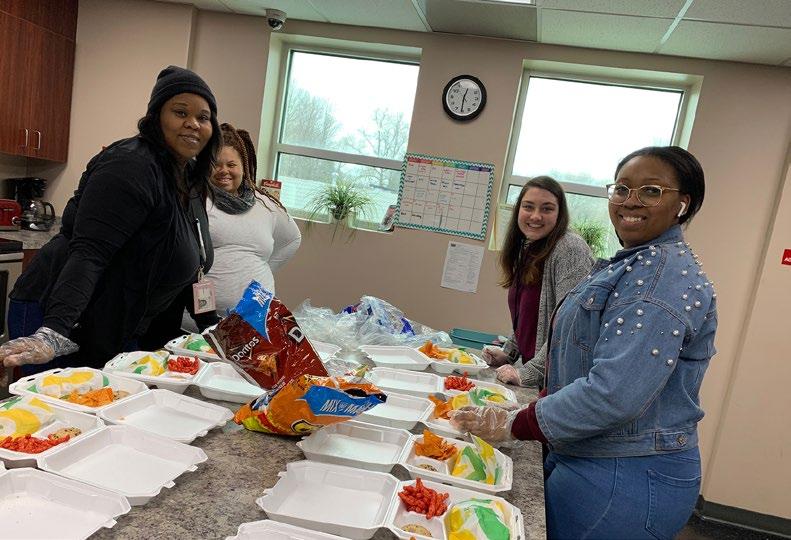
Epworth Children & Family Services – a nonprofit that helps children, youth, and families move toward self-sufficiency by focusing on health, housing, education, and employment – recently entered a partnership with the NAACP St. Louis County. Epworth will receive more than 1,000 meals on a weekly basis from the NAACP St. Louis County as part of its new food distribution program during the current pandemic. The first meal delivery took place on April 24 at 10 a.m. at Epworth’s Normandy campus, the Carleen Goddard Mazur Drop-In Center located at 7520 Natural Bridge Rd. The donated meals included pre-packaged lunches filled with sandwiches, snacks, fruit and a healthy beverage. “We are extremely happy to partner with the NAACP St. Louis County Branch,” said Epworth President and CEO Dr. Michael Panicola. “Epworth has been meeting the needs of at-risk and inneed children, youth and families since 1864, and we are more than pleased to continue this important work during these very difficult times.”

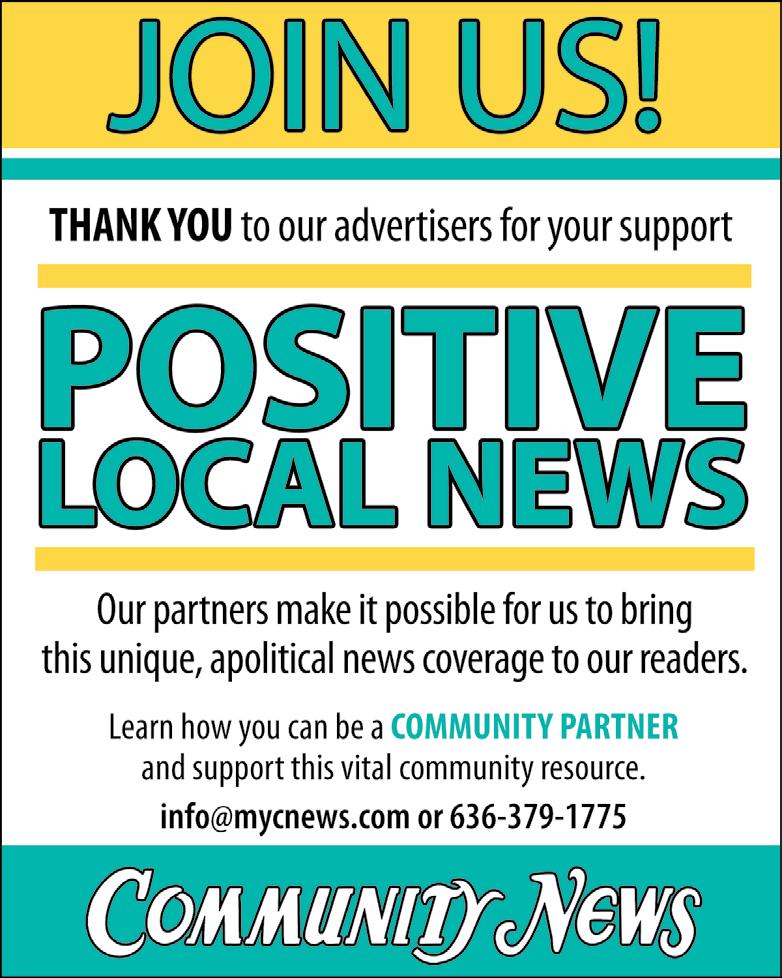
www.treesbywoody.net

AroundTown Answering the call STLCC student weathers storm of COVID-19; embarks on nursing career
As the COVID-19 pandemic continues to impact our lives, Richelle Herron has a renewed sense of purpose.
Herron, 38, will graduate with an associate degree in nursing from St. Louis Community College in May. Her life was turned upside down in mid-March when COVID-19 attacked her family. The virus claimed the life of her beloved grandmother, Josie Lee Everett. Herron and her husband, Carl, as well as Herron’s mother, Carolyn Wallace, all were infected and required hospitalization. They all have been discharged and continue to recover.
The death of her grandmother, herself a nurse for 50 years, has been particularly painful.
“I deal with grief on a daily basis because my grandmother and I were closer than close,” Herron said. “She was my grandmother, sister, best friend, mentor, everything. She raised me when I was a newborn while my mother was in the military. We have a bond that death cannot break, but it is indescribably difficult to be outside of her presence right now, especially with my completion of school. I wanted her to be the one to pin me at our pinning ceremony. Not only is that impossible now, but there will not be a pinning due to the social distancing issues.”
Herron credits her faith, resolve to excel in whatever she commits herself to do, and a strong sense of purpose in leadership as elements that push her through this emotional and physical storm.
“Nursing is in my DNA,” said Herron, whose mother also has been a nurse for more than 25 years. “I am a caring, nurturing and intuitive person. I have a background in customer service, but I’ve always been interested in helping and understanding others, medicine and how to best make an impact on the world that will last when I leave.”
With graduation on the horizon, Herron is well prepared for the challenges that lie ahead.
“Having been a COVID-19 patient, experiencing the fear of the unknown, the psychological toll of isolation and the pain of familial loss from this pandemic, I know that the healthcare professionals – but mainly the nurses who took care of me and my family – made and continue to make the difference,” Herron said. “Personally, nurses were my point of contact. They had the most personal contact with me, gave me medicine, brought me my food, and helped me move around my room when I was too weak
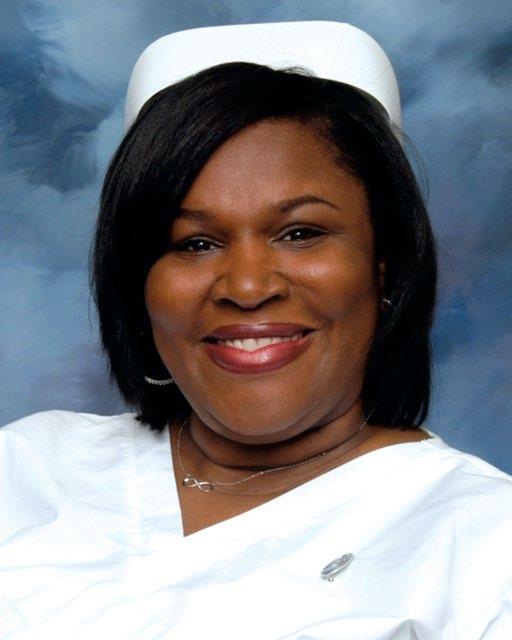
to do those things on my own.”
Karen Mayes, professor in nursing who also serves as STLCC’s director of nursing education, said she knew Herron had a heart for making a difference from the first time the two met.
“She genuinely wants to help others, whether it be through her service as the Florissant Valley Student Nurse Association president, her many communications of support to the students, and through heart-to-heart thoughtful conversations with faculty and administrators on how to improve the educational process,” Mayes said. “Her intellect, wisdom, smile and enthusiasm provide motivation to those around her. Now, as someone who has survived being a COVID-19 patient, she will have a new outlook and be better able to provide empathetic care to her patients as she soon enters the nursing profession.”
Herron will join the staff of Mercy Hospital St. Louis. The Spanish Lake resident, who will celebrate her 11th wedding anniversary on July 4, is ready to embark on a mission to defeat not only this pandemic, but also whatever challenges are thrown at her profession in the future.
“I hear a lot of people say that nursing is a job that they admire, but they just don’t have the stomach or the nerves for,” Herron said. “They ask why anyone would willingly jump into such a dangerous and sometimes ‘thankless’ profession. I am eagerly anticipating the completion of our degree so that we can all get out there and join this fight. It is truly one that we have been trained for and one that we can win.” Richelle Herron will graduate with an associate degree in nursing from St. Louis Community College in May. Her life was turned upside down in midMarch when COVID-19 attacked her family. SUBMITTED PHOTO



6632 Mexico Road | StPeters, MO (636)387-1216 HOURS: Sun - Sat 11am to 9pm






COLLIER’S FH






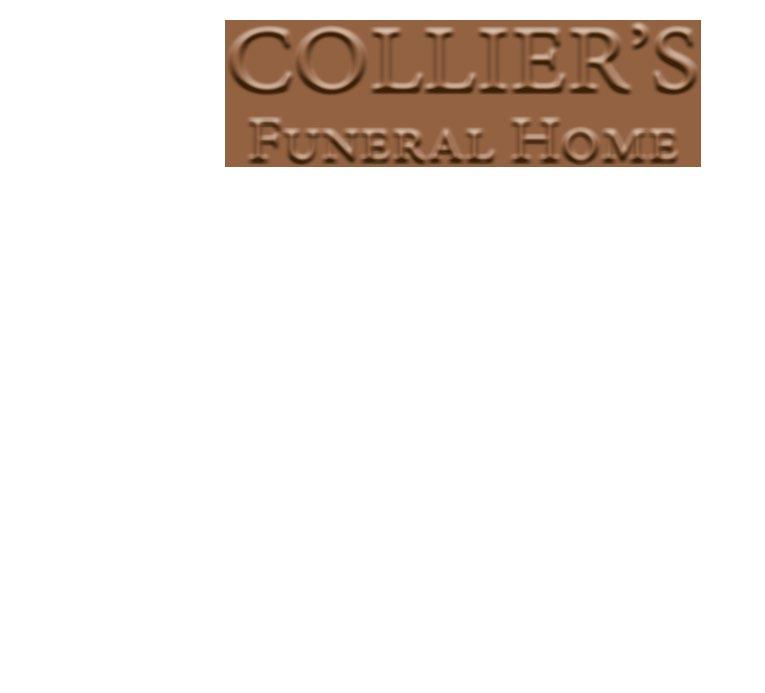
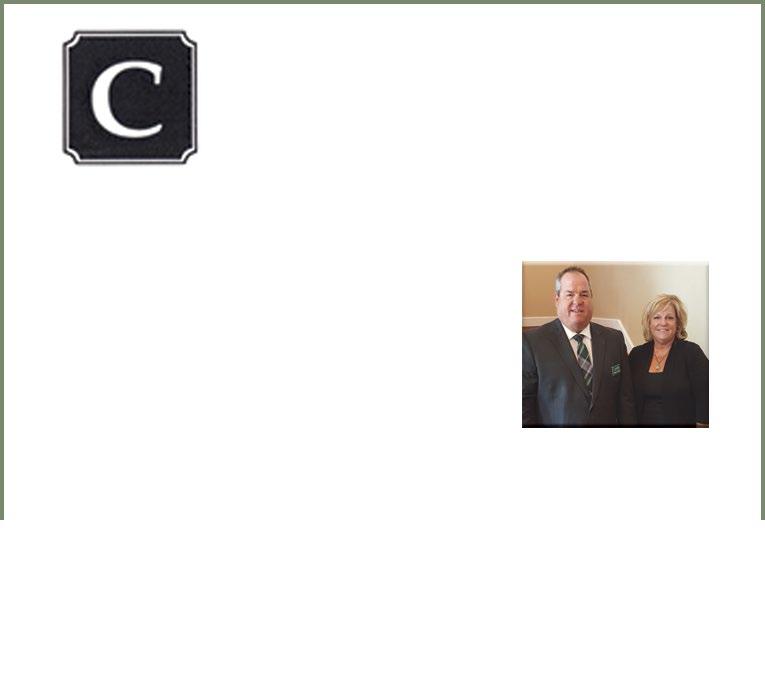
G •Traditional&NontraditionalServices •Cremation Services •MemorialServices •AnatomicalDonations •PrearrangedFuneralPlans A fullservicefuneralhomeoffering:
N L B S. A, M colliers@colliersfuneralhome.com www.colliersfuneralhome.com
AroundTown
The American Lung Association’s 2020 “State of the Air” report found that St. Louis has earned poorer rankings for the nation’s most widespread air pollutants – ozone and particle pollution – both of which can be deadly.
The Lung Association’s annual air quality “report card” tracks Americans’ exposure to unhealthful levels of particle pollution and ozone during a three-year period. Once again, the report found that nearly half of all Americans were exposed to unhealthy air.
“This year marks the 50th anniversary of the Clean Air Act, which has been responsible for dramatic improvements in air quality. However, St. Louis residents are breathing more unhealthy air compared to last year’s report, placing our health and lives at risk said American Lung Association’s Susannah Fuchs, Director, Air Quality. ”Furthermore, with nearly half of Americans breathing unhealthy air, our ‘State of the Air’ report shows the nation has much more work to do when it comes to air pollution and public health.”
Each year the “State of the Air” provides a report card on the two most widespread outdoor air pollutants, ozone pollution, also known as smog, and particle pollution, also called soot. The report analyzes particle pollution in two ways: through average annual particle pollution levels and short-term spikes in particle pollution. Both ozone and particle pollution are dangerous to public health and can increase the risk of premature death and other serious health effects such as asthma attacks, cardiovascular damage and developmental and reproductive harm. Particle pollution can also cause lung cancer, and new research links air pollution to the development of serious diseases, such as asthma and dementia.
This year’s report covers 2016, 2017 and 2018, the years with the most recent quality-assured data available collected by states, cities, counties, tribes and federal agencies. Notably, those three years were among the five hottest recorded in global history. Rising temperatures lead to increased levels of ozone pollution. Changing climate patterns also fuel wildfires and their dangerous smoke, which increase particle pollution. Ozone and particle pollution threaten everyone, especially children, older adults and people living with a lung disease. Although this report does not cover data from 2020, amid the COVID-19 pandemic, the impact of air pollution on lung health is of heightened concern. Learn more about that at Lung.org/covid-19. Particle Pollution in St Louis
“State of the Air” 2020 found that year-round particle pollution levels in St. Louis slightly higher than in last year’s report.
“Particle pollution can lodge deep in the lungs and can even enter the bloodstream. It can trigger asthma attacks, heart attacks and strokes and cause lung cancer,” said Fuchs. Particle pollution comes from coal-fired power plants, diesel emissions, wildfires and wood-burning devices.
“We all have the right to breathe clean, healthy air. The 50th anniversary of the Clean Air Act serves as a critical reminder that Americans breathe healthier air today because of this landmark law,” said Fuchs. “At the same time, this year’s report shows that we must continue to work for clean air – and especially to safeguard our most vulnerable community members.”
While this year’s report examined data from 2016-2018, it also provides air pollution trends back to the first report. Learn more about our city’s rankings, as well as air quality across the state and region and the nation, in the 2020 “State of the Air” report at Lung. org/sota. Breathing trouble New report: St. Louis air quality worsened for ozone
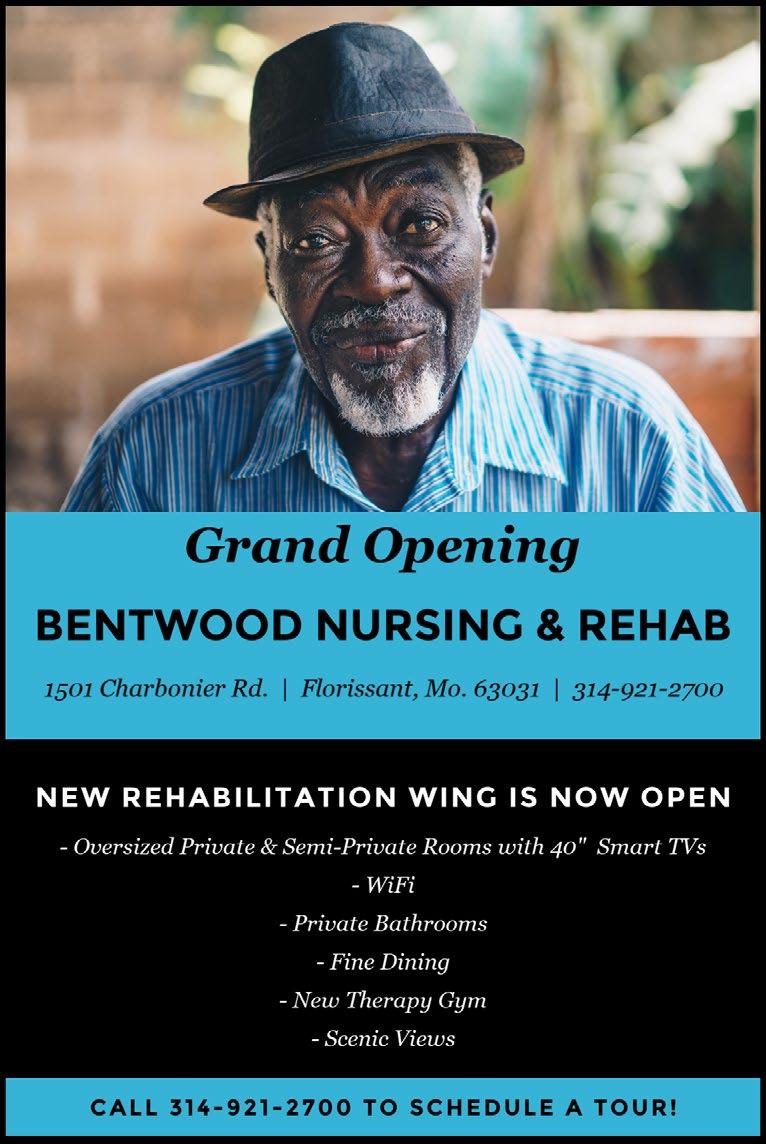
Ozone Pollution in Metro St. Louis
Compared to the 2019 report, St Louis experienced more unhealthy days of high ozone in this year’s report.
“Ozone pollution can harm even healthy people, but is particularly dangerous for children, older adults and people with lung diseases like COPD or asthma,” said Fuchs. “Breathing ozonepolluted air can trigger asthma attacks in both adults and children with asthma, which can land them in the doctor’s office or the emergency room. Ozone can even shorten people’s lives.”
This report documents that warmer temperatures brought by climate change are making ozone more likely to form and harder to clean up. Significantly more people nationally suffered unhealthy ozone pollution in the 2020 report than in the last three “State of the Air” reports.
Mental health in a time of crisis Local groups are rising to meet the challenges that the COVID-19 pandemic to mental health in the community
BY CHARLOTTE BEARD
Behavioral Health Response (BHR) services for mental health has experienced a surge of calls for help due to this COVID-19 crisis. The community has long witnessed the impact of COVID-19 in how various sectors of the community are temporarily interacting with the public whether in the food industry, education, or emergency response. However, there has been somewhat limited response until recently in how the crisis impacts mental health.
The Saint Louis Mental Health Board (MHB) has provided aid to help ensure local mental health agencies have what they need to serve those in mental crisis. According to Executive Director, Jama Dodson, the board recently approved $500,000 of additional emergency funding to more than 35 mental health organizations for the purpose of increasing resources or transitioning from in-person service to virtual service provisions.
“A lot of folks were not prepared to do that,” stated Dodson, “so they needed the equipment, the software, or (other technology) to be able to provide their services online to the clients that were seeking help.”
MHB is an independent government taxing authority that administers two special property taxes: the Community Mental Health Fund and the Community Children’s Services Fund. Tax dollars are granted to non-profit organizations that provide high quality services that benefit city residents. Dodson shared that normally there is a specific application process for the grants, however, these recent funds were rendered through an abbreviated process to expedite funding due to the pandemic.
“One thing that is of concern to most of us out there in the community that do this kind of work is that when families are (somewhat) kept locked in place in their homes (with) a lot of time spent together, sometimes that’s good but sometimes it’s not so good,” stated Dodson. “In some families, it’s likely (that the pandemic) will increase difficulties with their children. We’ve been concerned about child abuse and neglect issues when families are (somewhat) stressed by having to be together without any let-up – no (oncampus) schooling and parents having to teach classes.”
Sources from the St. Louis Public Health administration indicate that some people may be experiencing depression or anxiety if they have major concern about being able to effectively care for their children or others in their care. On April 22, the administration released a document that offers various tips for maintaining individual mental health during this stressful time as well as resources to obtain help.
One of the main tips the document gives in recognizing the warning signs for depression, anxiety or suicide is to recognize “everyone reacts differently to stressful situations like social distancing, quarantine or isolation.” The document advises individuals or their loved one experiencing any of the reactions for more than two weeks to contact their health care provider or one of the resources provided in the document which can be found at http://stlcorona.com/news/ dph-covid-19-update-4222020.
St. Louis Public Health administration advises individuals to reach out to people remotely they trust to help reduce anxiety, depression, loneliness and boredom during social distancing, quarantine and isolation. However, for some people this may not be an option. Some faith-based establishments have found that Stephen Ministries is a resource for these individuals who do not require professional assistance. The independent, St. Louis nonprofit organization is home to a program that is utilized within church congregations and organizations worldwide to provide one-on-one care to individuals in crisis.
Stephen Ministries receives local calls and calls from church leaders in other states for referrals to local caregivers, referred to as Stephen Ministers.
Ken Haugk, Ph.D., who is the Founder and Executive Director for the organization stated, “That (happens) on an ongoing basis. We do this in normal times. We get Stephen Ministers for (approximately) 25 people (weekly) who need it around the country. People being (normally) cared for by Stephen Ministers are for typical crises (such as) loss of a loved one, terminal illness, separation, or divorce. With COVID-19, these struggles are increased. You are grieving the loss of a loved one – that is bad enough. (Now) the COVID-19 is on top of it.”
Another demographic which may be mentally impacted during the crisis are those that have become unemployed. As of April 23, the U.S. Bureau of Labor Statistics indicated that the Missouri unemployment rate for reported cases in February 2020 was 3.5 percent. In March, the preliminary rate increased to 4.5 percent for reported cases.
“Grief is probably the number one reason for having a Stephen Minister (as it relates to) mild depression, loneliness spiritual struggles, or a terminal illness,” stated Haugk. “But another big group where Stephen Ministers normally have cared for people is when people have financial problems, or they’ve lost a job. I would imagine that this is going to be happening more and more since more and more people are losing jobs. The percentage of people who have lost jobs being ministered to by Stephen Ministries’ ministers (will likely) go up and it’s already going up.”
Individuals with non-critical care needs may contact Stephen Ministries for a referral Monday through Friday 8 a.m. to 5 p.m. at 314-428-2600. To find out more about the organization visit https:// www.stephenministries.org. For care 24 hours a day, call United Way’s 2-1-1 hotline or visit https://www.211unitedway. org/2020/04/22/coronavirus-information-2020. The National Suicide Prevention Lifeline can be reached at 1-800- 273-8255 or text TALK to 741741 to text with a trained crisis counselor from the Crisis Text Line for free, 24/7.
AroundTown Fighting hunger The St. Louis Area Foodbank announces goal of distributing 10 million meals by June 30
The St. Louis Area Foodbank, the bi-state region’s largest food provider to people in need, recently received a grant of $502,563 from Missouri Foundation for Health (MFH) to address the increased need for food assistance as result of the COVID-19 pandemic. With this strategic investment from MFH and support from the community, the Foodbank aims to distribute more than 10 million meals to children, families and seniors in the St. Louis region by June 30.
Specifically, the St. Louis Area Foodbank will use MFH grant funds in the following ways: • Hiring of 20 full-time temporary employees to assist in increased distribution efforts throughout the foodbank’s 14-county service territory in Missouri. • Equipment for capacity building to support our increased distribution efforts. The foodbank will rent four additional trucks over the next 10 weeks to ensure that food is getting to people in need as quickly as possible. • Trailers for increased storage capacity to increase the foodbank’s ability to source and distribute more food to families impacted by the COVID-19 crisis. • Organize 70 Disaster Mobile Markets to bridge service area gaps created by volunteer-led food pantries who have temporarily shut their doors. • Ongoing food support to the foodbank’s network of community partner agencies to purchase food and other materials each week that will nourish and empower families. • Infant formula for vulnerable parents with infants seeking formula resources due to the empty shelves in grocery stores.
In Missouri, the St. Louis Area Foodbank has 384 partner agencies (food pantries, soup kitchens, shelters, etc.) and community program partners located in 14 area counties. The organization is in constant communication with its partners to assess evolving need and provide guidance for food distribution safety for staff, volunteers, and individuals receiving food assistance.
The foodbank is also collaborating with schools, hospitals and other partners to hold “drive thru” food distributions as a “contact-less” means of distributing emergency food boxes, fresh produce, frozen meat, personal care items, and household essentials to high-risk, high-need and low-access communities.
The foodbank is also the only local distributor of food to lowincome seniors through the Community Supplemental Food Program (CSFP). Whenever possible, the organization is delivering two months-worth of food boxes. By providing a two-month supply, it reduces the risk of seniors being exposed to COVID-19.
A helping hand
Missouri Foundation for Health (MFH) has awarded grants to both the St. Louis Area Foodbank - the bi-state region’s largest nonprofit food provider - and Operation Food Search (OFS) - a nonprofit hunger relief organization serving the St. Louis region and state of Missouri.
In conjunction with this investment, the Foodbank and OFS are partnering with the St. Louis Regional Chamber to hire workers displaced by the coronavirus outbreak to help keep up with the increased need for food assistance.
These temporary employees, including displaced food service professionals, will work full-time for the next 10 weeks at the Foodbank and OFS to help sort, package and distribute food to local kids, families and seniors.
The recruitment firm Labor Finders will screen qualified applicants and conduct the hiring. Interested parties are encouraged to contact Labor Finders by phone at either its St. Louis office at 636-287-3709 or St. Peters location at 636-244-9080.
The St. Louis Regional Chamber will promote the employment opportunities among its members who may have employees who are unemployed or temporarily furloughed by COVID-19 related layoffs.
“We are living and operating in times we have not seen before,” said Senior Vice President, Inclusion and Talent Attraction at the St. Louis Regional Chamber, Valerie E. Patton, MA, MSW. “The St. Louis Regional Chamber’s engagement in this collaborative is imperative to assist in the recovery of economic and employment opportunities in the region. ”
Both the Foodbank and OFS have seen spikes in the need for food assistance since the COVID-19 outbreak hit the region in mid-March. Currently, getting food to area residents as quickly as possible is of the utmost importance as people who have never needed help before are now struggling to make ends meet.
This investment by Missouri Foundation for Health not only aids in the current response efforts by the St. Louis Area Foodbank and Operation Food Search, but also addresses the various changing needs of Missouri’s workforce.
A portion of the grant funds will be used by both organizations to purchase additional food to meet the increased need for food assistance.
This collaborative effort aims to reduce the recovery time for the region and prevent people from needing to receive food assistance. The St. Louis Area Foodbank and Operation Food Search awarded grants to hire displaced workers





